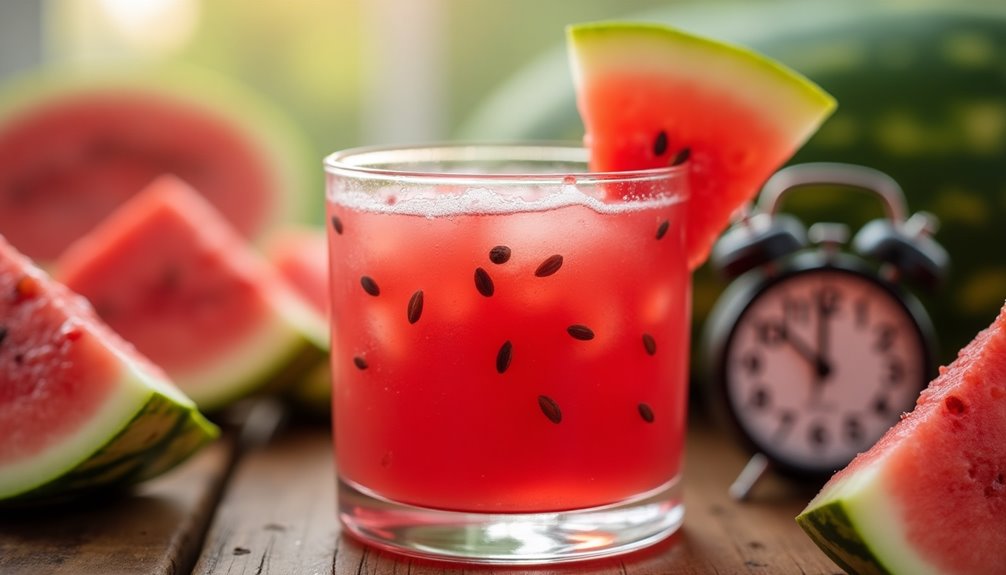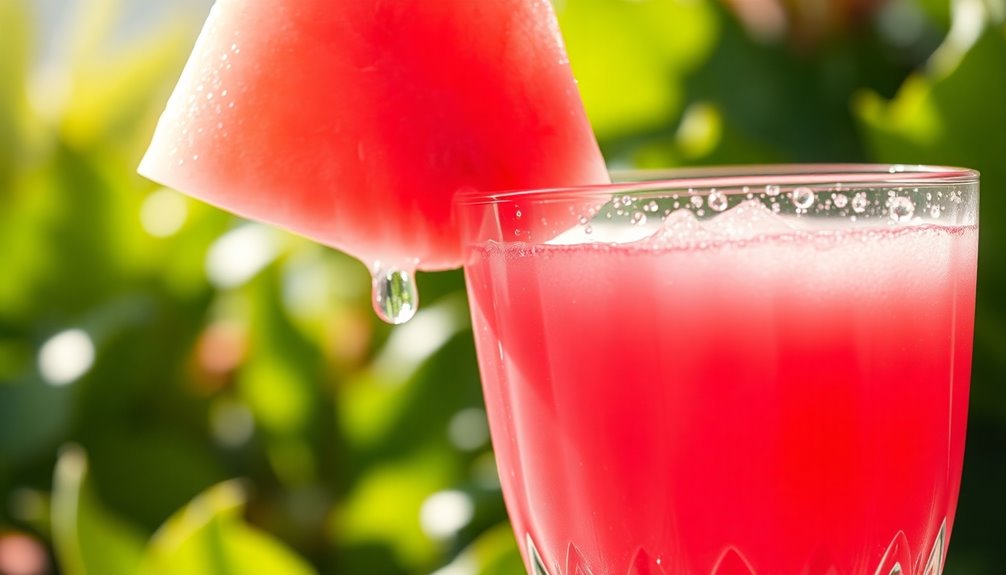Watermelon juice is best enjoyed fresh and stays good for about 2-3 days when you store it properly in the fridge. You’ll experience the peak flavor within the first 24 to 48 hours after blending. To keep it fresh longer, use an airtight container to limit oxidation. Always check for signs of spoilage, like odd smells or discoloration. If you want to know how to extend its shelf life even further, keep on exploring! Additionally, you can consider freezing watermelon juice in ice cube trays, which allows you to enjoy it at a later date without losing flavor. If you’re curious about other liquid preservation methods, you might wonder how long does vape juice last in comparison. While vape juice can typically last for months when stored in a cool, dark place, it’s important to also check for any changes in taste or color over time.
Key Takeaways
- Fresh watermelon juice is best consumed within 24 to 48 hours for optimal taste and quality.
- Homemade watermelon juice lasts about 2-3 days when stored in an airtight container in the fridge.
- Signs of spoilage include odd smells, discoloration, visible mold, or changes in texture; discard if any are present.
- Frozen watermelon juice can last up to 16 months when poured into ice cube trays and stored properly.
- Commercial watermelon juice can last 5-7 days past its expiration date if unopened and refrigerated; opened bottles should be consumed promptly.

When it comes to enjoying fresh watermelon juice, you'll want to drink it within 24 to 48 hours for the best taste and quality. This refreshing drink, made from ripe, juicy watermelons, is at its peak flavor right after you blend it. If you're making homemade juices, you need to know that the fresher, the better.
When watermelon juice is stored in the fridge, it typically lasts about 2-3 days when kept in an airtight container. This helps prevent exposure to air, which can lead to oxidation and spoilage.
To ensure you're savoring the optimal taste, pay close attention to the signs of spoilage. If your watermelon juice starts to develop odd smells, discoloration, or visible mold, it's time to discard it. These warning signs indicate that your juice has gone bad and is no longer safe to consume.
You might think about how disappointing it's to toss out your hard work, but keeping an eye on these details will help you enjoy your drink while it's still fresh and delicious.
If you find yourself with more watermelon juice than you can drink in a couple of days, don't fret! One great way to extend its shelf life is by freezing watermelon juice. Pour your juice into ice cube trays, and once frozen, transfer the cubes to a freezer-safe bag.
This method allows you to enjoy your refreshing drink well beyond the typical fridge shelf life, with frozen watermelon juice lasting up to 16 months. You can easily pop a few cubes into smoothies or other recipes, bringing that summertime flavor back to your kitchen any time of the year.
For those who prefer commercial options, unopened bottles of watermelon juice can last 5-7 days past their expiration date when refrigerated. However, once opened, you'll want to follow the same guidelines as homemade juices and consume it within a few days for the best experience.
It's always wise to check the packaging for any specific instructions, as different brands may have varying recommendations.
Frequently Asked Questions
Does Watermelon Juice Go Bad?
Yes, watermelon juice can go bad.
You'll notice signs of spoilage like odd smells, discoloration, or visible mold. If you've left it out at room temperature for more than two hours, it's best to discard it.
Homemade juice is more prone to spoilage than store-bought due to the lack of preservatives.
To keep it fresh longer, store it in an airtight container in the fridge or freeze it for extended shelf life.
How Long Can Watermelon Juice Last at Room Temperature?
Picture a summer sun setting on your picnic, and there's that delicious watermelon juice, glistening in the light.
But don't let it linger too long! At room temperature, you've got about 2 hours before it starts to become a playground for bacteria.
If the temperature soars above 90°F, sip it down or chill it within an hour.
Keep an eye out for any strange smells or colors, and stay safe!
Can Watermelon Go Bad in the Refrigerator?
Yes, watermelon can go bad in the refrigerator. If you notice an off smell, discoloration, or any mold, it's time to toss it.
Even in the fridge, watermelon's freshness diminishes over time, so it's best to consume it within a few days. Always store it in an airtight container to keep it fresh longer.
How Do You Preserve Watermelon Juice?
To preserve watermelon juice, you'll want to store it in airtight containers, preferably glass jars, to keep it fresh.
Refrigerate it promptly after making, as it can spoil quickly at room temperature.
For longer storage, freeze the juice in ice cube trays, then transfer the cubes into freezer-safe containers. This method can extend its shelf life significantly.
Always check for any off odors or discoloration before consuming stored juice to ensure it's safe.
Conclusion
So, you've juiced that glorious watermelon, and now you're wondering how long it'll last before it turns into a science experiment. If you're storing it in the fridge, enjoy it within three to five days—after all, you don't want your drink to start growing legs and running away! If you're feeling adventurous, freeze it for a later date, but don't wait too long; even watermelon juice deserves a chance to be fresh and fabulous!
Cindy thoroughly researches juicing trends, techniques, and recipes to provide readers with practical advice and inspiration. Her writing style is accessible, engaging, and designed to make complex concepts easy to understand. Cindy’s dedication to promoting the advantages of juicing shines through her work, empowering readers to make positive changes in their lives through the simple act of juicing.











